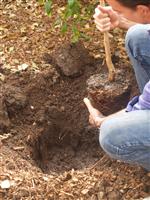Skills Shortage

Agriculture and horticulture has suffered in Australia an other parts of the world in recent years.
As a result, many people have left the industry, creating skills shortages in some areas, and the potential for even greater skills shortages over coming years.
Industry experts and reports have been foreshadowing the need for a massive increase in training for horticulturists and agriculturists -but as yet these needs are not being met
Skills shortage: Opportunity or Crisis in Horticulture and Agriculture?
The skill base of the Australian Agriculture and Horticulture industries could collapse within a decade thanks to a looming crisis in education. According to ACS Distance Education Principal John Mason, the impact of the drought was causing shifts in educational programming that would continue to hit the industry long after the rain returned.
"The drought has seriously affected job opportunities in these sectors in recent years," Mr Mason said.
"The lack of career opportunities has led to a major skills shortage and experienced people have been hemorrhaging to other industries. This has led to a reduction in enrolments in agrarian study programs, as well as a reduction in experienced teaching staff to deliver them.
"We are now facing a serious education crisis because we are simply not training enough people to fill the jobs that we will be relying on in the future to ensure the quality and affordability of our food supply. The industry needs to wake up and act now before it's too late."
Mr Mason said more than 50,000 people had left the industry in recent years and training opportunities were declining. But despite this trend, it was expected that more than 123,000 jobs would be created in the Agricultural and Horticultural sectors over the next six years.
"It is obvious from these figures that we are entering into an unsustainable position in this industry," Mr Mason said.
"But not only is the availability of expertise and educational places in these fields on the decrease, the quality of education is also declining.
"The significance of science and fundamentals like plant identification has diminished in some if not most courses. Consequently, graduates are now being turned loose in the workforce with serious gaps in their basic knowledge within their own field.
"We are going to end up in a situation where we have very limited expertise being stretched very thinly over a chronically understaffed industry."
Mr Mason added, "This is a serious situation because drought or no drought, people will always have to eat. So the state of the Agriculture and Horticulture industries in this country will have a direct impact on the cost and quality of our food supply in the future, as well as affecting the quality of our natural environment."
He said industry needed to step up its act and work to counter negative public perceptions.
"People have the idea that there is no future in the industry because the drought has kicked it into an inevitable decline," Mr Mason said.
"Industry groups need to communicate the reality of the expanding job market and the looming skills shortage in order to attract people to work in that sector.
"We also need to put in place better incentives for people to study and work in horticulture and agriculture and improve the quality of education at vocational level. There should be a far greater emphasis on foundation science and problem solving skills to ensure newly qualified people have the skills they need to do the job."
More Information:
ACS Distance Education provides Free Course & Career Advice
Contact [email protected] or www.hortcourses.com
Opportunities exist for anyone with the foresight to prepare now for demands that develop in the future; as indicated by this media release from the Agri Food Industry Skills Council on 27th September 2007:
Industry Skills Councils to rebuild agriculture when drought breaks
The Agri-Food National Conference in Sydney was told today that 50,000 to 70,000 people had left agriculture in recent years, but that people with skills and training would be needed when the drought breaks to rebuild farms and rural communities. The Minister for Vocational and Further Education, Andrew Robb, told the two-day conference in Sydney - hosted by the Agri-Food Industry Skills Council - that the chronic labour shortage affecting agriculture was expected to get worse. See attached Media release.
The Agri-Food National Conference 2007 got under way in Sydney today, the only national forum covering the $208 billion a year agri-food industry - rural industries, meat, and seafood, food processing and racing. It is the biggest agri-food conference on the national calendar, focusing on training products and vocational skills.
More than 160 delegates from across the agri-food industries, leading training identities and government are examining the state of the industry, the health of rural communities, the impact of the drought, skills crisis and equine flu, and innovations for training products and services. For full conference details go to: www.agrifoodskills.net.
For advice on preparing for your future in the horticulture or agriculture industries, use our free career & course counselling service: click here
Join us on TWITTER or FACEBOOK
Buy Horticulture Books from our Mail Order Bookshop
You may also be interested in....
Exceptional training for a serious business or career -lots of different options to specialize.
View Course